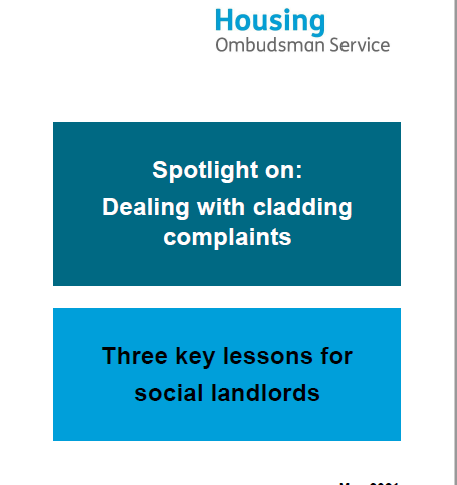Housing Ombudsman urges social landlords to do more to address residents’ individual circumstances in cladding complaints
18 May 2021
A new report identifies three key lessons for social landlords in dealing with complaints about cladding to ensure that the impact on all residents is recognised

The Housing Ombudsman has identified three key lessons for social landlords in dealing with complaints about cladding to ensure that the impact on all residents is recognised. Our report, published today, focuses on where we have received most complaints – the response of social landlords to leaseholders and shared owners seeking to re-mortgage, staircase or sell – and highlights the Ombudsman’s concern with fairness.
While social landlords have prioritised their remedial programmes based on the fire risk to residents, the Ombudsman is concerned that residents’ individual circumstances are sometimes at risk of being lost because of the scale of the challenge facing landlords. The report provides important lessons and practical recommendations that are within landlords’ control. The three key actions in the report are for landlords to:
- provide a clear road map on inspections, with timescales, that adequately considers the broader implications for all residents, especially those living in buildings below 18 metres.
- communicate effectively with residents, ensuring the strategy is robust, well-resourced and proactive.
- address residents’ individual circumstances, exercising discretion where appropriate as with other complaints.
The report is based on complaints handled by the Ombudsman between October 2019 and March 2021. Overall, we considered 64 complaints on the issues covered in the report, with 17 entering our formal remit for investigation and maladministration found in 88 per cent of those cases. A table in the report identifies eight landlords with findings on these issues.
Richard Blakeway, Housing Ombudsman, said: “At the heart of the cladding crisis there exists extreme unfairness and residents, through no fault of their own, will feel this sense of injustice most. In our decisions we have been clear about what it is reasonable to hold social landlords responsible for, but however difficult the situation is for landlords it is infinitely worse for any resident living in a home affected by this crisis.
“Our casework reveals the extraordinary lengths residents are taking to overcome the barriers preventing them re-mortgaging, staircasing or selling – and central to our report is concern about residents’ individual circumstances being lost because of the enormity of the challenge facing social landlords.
“The building safety crisis is broad and I am acutely aware that the limitations of our jurisdiction mean in this situation our remedies may not always provide complete resolution. Yet our decisions can make a difference and ensure a resident’s voice is heard. The purpose of this report is to extend our recommendations further, to the benefit of far more residents.
“Every social landlord whose residents are affected should consider the actions in the report. I would urge senior leaders to discuss them at their governing body and share their response with their residents.”
We have taken a three-pronged approach in considering what is fair in all the circumstances of complaints involving cladding, set out in guidance published last year. The report looks at each of the three areas – long term compliance plans, communication and responding to individual circumstances. Case studies throughout illustrate the real-life experiences of individual residents.
